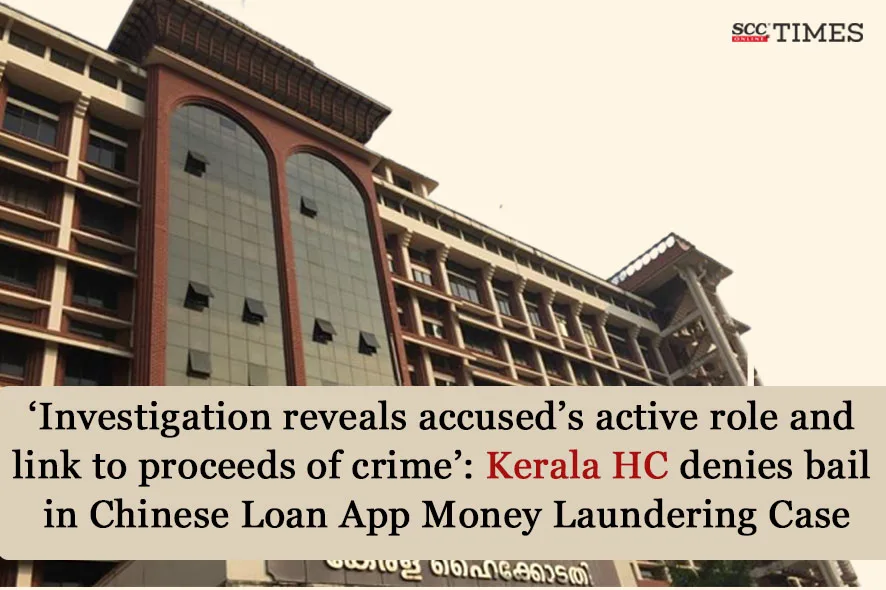Kerala High Court: In the Chinese loan App money laundering case, the Single Judge Bench of Bechu Kurian Thomas, J., dismissed the bail application, citing the serious nature of the allegations and the strong prima facie case established against the accused. The Court held that the facts emerging from the investigation clearly indicated the accused’s active involvement in the alleged offence and his significant role in acquiring and managing the proceeds of crime. The Enforcement Directorate had collected material that constituted a prima facie case under Section 3 read with Section 4 of the Prevention of Money Laundering Act, 2002.
Background
The fifth accused in Enforcement Case Information Report (‘ECIR’) registered by the Enforcement Directorate, along with the other accused, was alleged to have committed offences punishable under Sections 3 and 4 of the Prevention of Money Laundering Act, 2002 (‘PMLA’).
According to the prosecution, various Chinese loan applications were circulated on social media platforms. These applications were not listed on the Play Store or App Store, as they were non-compliant with prevailing laws and regulations. The illegal loan applications were advertised and disseminated directly to potential customers through WhatsApp. Once installed, the accused gained control over sensitive data from the Android devices, including device IDs, precise GPS locations, contact lists, photographs, files, emails, SD cards, and other personal information. This data was allegedly used to extort money from the victims.
The prosecution further alleged that the proceeds of crime generated through this method were layered by utilizing mule bank accounts arranged by the accused and other co-accused. These accounts were used to debit funds to payment aggregators who had collected money from various merchants. A portion of the illicit proceeds was routed through bank accounts of shell entities in India, and the aggregated amounts were remitted abroad through normal banking channels under the guise of fake software imports. An analysis revealed credits from several dummy entities and debits amounting to approximately ₹121 Crores.
It was also alleged that the accused had arranged 289 bank accounts in the names of individuals and shell business entities in exchange for financial remuneration from cyber fraudsters.
Analysis and Decision
The Court observed that the accused was alleged to have enabled the circulation of various Chinese loan applications on multiple social media platforms and facilitated the opening of numerous mule bank accounts, through which members of the public were defrauded. The investigation revealed that the accused had approached one person offering ₹5,000 per bank account. Based on this arrangement, 154 bank accounts were opened in different banks including Punjab National Bank, Canara Bank, ICICI Bank, HDFC Bank, and Axis Bank. The accused then digitally submitted these account details and managed to arrange an additional 290 bank accounts. These details were forwarded to a woman, who had contacted the accused online. These accounts were subsequently used to operate illegitimate loan applications and cheat the public out of large sums of money.
The investigation further revealed that the proceeds of crime collected from victims via online platforms were deposited into the mule accounts. These funds were then routed through various bank accounts and eventually parked in shell companies. The accused was alleged to have played a key role in arranging these mule accounts, where proceeds of the scheduled offences were collected and later diverted to bank accounts outside India.
The Court noted that mule accounts had been opened within Kerala with the help of individuals including the accused. Funds debited from these accounts were traced to third parties, and the investigation identified a money trail indicating that ₹121 Crores had been collected through online exploitation and ultimately transferred to four foreign wallets.
Further, the accused’s role in facilitating the acquisition of proceeds of crime was found to be substantial. He was alleged to have supplied 289 mule bank accounts to cyber fraudsters through two women via WhatsApp. Additionally, the accused was found to have arranged cryptocurrency accounts on the platform WazirX and to have been actively involved in remitting ₹3.47 Crores to four foreign crypto wallets. He allegedly received ₹2 Crores in return, which was deposited in his accounts with IDBI Bank, Kotak Mahindra Bank, and Bank of Baroda. Out of this amount, he distributed ₹30 lakhs to various individuals who had helped arrange the mule bank accounts.
The Court held that these facts, as brought out during the investigation, clearly indicated the accused’s involvement in the alleged offence and his active role in acquiring and managing the proceeds of crime. The materials collected by the Enforcement Directorate established a prima facie case under Section 3 read with Section 4 of the Prevention of Money Laundering Act, 2002.
Given the gravity of the allegations and in the absence of any material before the Court concluded that the accused was not guilty of the alleged offences, the Court held that the rigours of Section 45 of the PML Act were attracted. Consequently, the accused was not entitled to the relief of bail. Accordingly, the bail application was dismissed.
[Sayid Muhammed v. Directorate of Enforcement, 2025 SCC OnLine Ker 5361, decided on 08-07-2025]
Advocates who appeared in this case:
For Petitioner: Lijin Thamban, Anju Gireesh
For Respondent: Jaishankar V. Nair, SC


